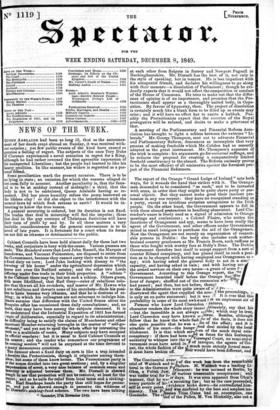Cabinet Councils have been held almost daily for these last
two weeks, and conjecture is busy with the cause. Various guesses are ade. The Standard avers that Lord John Russell, the Marquis of Lansdowne, and Viscount Palmerston, are disposed to retire from he Government, because they cannot carry their wish to reimpose fixed duty on corn; Lord John looking with dismay to "the wering of his house" under the agricultural depression which pares not even the Bedford estates; and the other two Lords infrering under free trade in their Irish properties. A " schism " the Cabinet there may be, but not such a schism. Others guess, ith more likelihood, that Earl Grey—ruler of rebellious cobea that thwart all his crotchets, and master of Mr. Hawes who
not rebellious and thwarts none of his crotchets—finds his posi .
!I to have become very irksome, and that he is desirous of reng ; in which his colleagues are not reluctant to indulge him. era surmise that difference with the United States about the osquito affair has occasioned these daily consultations; and, no dubs, that may have been among the subjects discussed. It is so understood that the Industrial Exposition of 1851 has formed topic of deliberation, especially in regard to its administration; !le difficulty being to satisfy the claims of Manchester and other _portant Member-returning boroughs in the matter of " self-goetnment," and yet not to spoil the whole affair by intzusting the L•th to at multitude of cooks. Many subjects may have occupied In official conclave: but it is usual to hold Cabinet Councils at tlle. season; and the. reader who remembers our programme of coming session • will not be surprised at the time devoted to litany momentous questions. The rumour about a fixed duty on corn is like a trap intended deceive the Protectionists, though it originates amongthemves., but some of them know better. The Protectionist party is the nonce divided into two great sections; and, by a singular Pensation of error, a very nice balance of 'common sense and rdity is adjusted between them. Mr. Disraeli is shrewd 'ugh to see that protection will not be restored, at least for the eat; and so he calls for relief from local taxes and a sinking'I. Earl Stanhope heads the party that still hopes for protec.n, ?aid yet is shrewd enough to perceive the wildness of tr. %brews sinking-fund scheme. The two have been talking at each other from Reigate in Surrey and Newport Pagnell in Buckinghamshire. Mr. Disraeli has the best of it, not only in the style of speaking, but in temper. He is less impatient with his antagonist friends, and declares his willingness to go along with their measure—a dissolution of Parliament ; though he evidently expects that it would not affect the composition or conduct of the House of Commons. He tries to make out that the difference of opinion is of no importance, and promises that the Protectionists shall appear as a thoroughly united body, in Opposition. By favour of hypocrisy, then. The project of dissolution is certainly much like a blank form to be filled up as events may arise ; and it will have no effect but to excite a hubbub. Possibly the Protectionists expect that the exercise of the Royal prerogative will be refused, and desire to make a grievance of that.
A meeting of the Parliamentary and Financial Reform Association has brought to light a schism between the extreme "Liberals." Mr. George Thompson, sent out to advocate Financial and Parliamentary Reform, denounces as incomplete that very process of making freeholds which Mr. Cobden had so recently adopted as the great instrument. Mr. Tbompaon's exposure of the trick is complete : his arguments go for universal suffrage, and he reduces the proposal for creating a comparatively limited freehold constituency to the absurd. The Reform emissary proves to be the most efficient of all emissaries against the foremost project of the Financial Reformers.
























